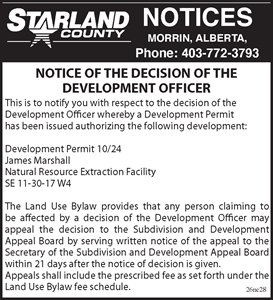Headlines and news stories across all media platforms were dominated by the ongoing COVID-19 pandemic throughout 2020, but there are countless stories and events which have impacted Drumheller and surrounding communities: new discoveries, changes, challenges, and successes.

1. From toilet paper shortages to enhanced health measures and lockdowns, the COVID-19 pandemic has been at the forefront of media attention.
The first presumptive case of COVID-19 was reported in Alberta on March 5. A week later, the first of many public health measures was enacted to curb the virus’ spread, and the Town of Drumheller also enacted a State of Local Emergency (SOLE). The first local case was not reported until May 1 and, at the June 1 council meeting, the SOLE was rescinded.
Local cases surged from a single active case on November 3, to 63 on November 23; a second SOLE was enacted on the same day, which remains in effect, a mandatory mask bylaw was passed.
On December 8, Premier Jason Kenney announced province-wide enhanced health measures restricting social gatherings which remain in effect until mid-January 2021 at the earliest.
Events, from the annual Canada Day parade to graduation ceremonies, were cancelled. Some found new ways to celebrate with social distancing regulations.
Businesses also found new ways to reach their
clients: online classes and virtual appointments, and offering curbside pickup and delivery service options.
2. Drumheller’s Flood Mitigation Office had a busy year, starting with the passing of the Land Acquisition Policy in January. The policy allows the Flood Mitigation Office to, fairly and objectively, acquire properties which would otherwise be unprotected by new flood mitigation efforts.
First phase of appraisals began in July and, by September, negotiations were underway. Phase two will not begin until detailed berm designs are available.
An assessment of the Red Deer River was conducted in February. Crews worked to maintain riverside vegetation, and Newcastle Beach was temporarily closed to the public in April.
Inspections on dikes throughout the valley was completed in September. Further assessment, by a Qualified Aquatic Environmental Specialist, was done in late October to ensure flood mitigation efforts will not negatively impact aquatic wildlife and fish habitats.
On November 30, the provincial government published draft engineering reports and flood maps following a two-year study of the Red Deer and Rosebud rivers, and their tributaries. A public engagement survey to ensure accuracy is open until January 15, 2021, and is available online at www.alberta.ca/drumheller-flood-study-engagement.aspx; future engagements are planned for 2021.
3. Delia and Morrin have been busy raising funds to build new schools for their respective communities.
Friends of Morrin School Council (FMSC) began fundraising early in 2020 for school enhancements, such as bleacher space and a library expansion. A total of $564,391.28 has been raised. The prime consultant was announced by Prairie Land School Division (PLSD) in October as Group2 Architecture and Interior Design.

Delia School Enhancement Society (DSES) achieved their fundraising goal of $1.2 million in 2019 and will continue fundraising to further equip the school with program and infrastructure needs. PLSD announced Shunda Contracting from Red Deer was awarded the tender in September. Shortly after, a groundbreaking ceremony was held. The name of the new school was decided at the December 15 PLSD board meeting following community input from a virtual town hall meeting; the new school will keep the name Delia School.
4. In-person learning for K-12 students across the province was postponed in March as the COVID-19 pandemic began. Students were to receive a final grade based on their marks as of March; however, classes shifted online and teachers and parents scrambled to put lessons in place.
Schools were permitted to reopen for diploma exams and summer school as Alberta entered the second phase of relaunch in June.
On July 21, it was announced students would return to in-person learning in September. Masks were made mandatory for staff and students from Grade 4 to 12; the Alberta government distributed more than 1.6 million masks to schools across the province.
Despite initial concerns, local enrollment was high. The first case of COVID-19 was reported in local schools in late November.
Grade 7 to 12 students moved to online learning on November 30, with all students moving online following winter break until January 11, 2021; diploma exams were also made optional.
5. The Alberta government proposed changes to the oil and gas assessment model in late July and presented four different scenarios.
Each scenario would have significant, and devastating, impacts to rural counties and municipalities; even under the best case scenario, Starland and Kneehill counties would stand to lose millions in tax revenue from oil and gas properties, with residents shouldering upwards of 200 per cent residential tax increases while facing reduced services and county viability uncertainties.
Local rural municipalities united over their concerns and met with Olds-Three Hills and Drumheller Stettler MLAs, Nathan Cooper and Nate Horner, to lobby against the proposed changes. The new Minister of Municipal Affairs Tracy Allard met with municipalities in October and announced the previous changes would be paused; she eliminated the Well Drilling Equipment Tax (WDET) on new drills, lowered assessments for “less productive” oil and gas wells, and exempted new wells and pipelines from property taxes for a period of three years.
The outcome was better than the four scenarios, however, rural counties will still face some impacts, the extent of which are not yet known.
6. On September 10, it was announced the post office in Rosedale was temporarily closed. Mail, and mail services, would be available to affected residents at the Drumheller Post Office.
In early December, nearly three months after the initial closure, it was confirmed the Rosedale Post Office would be closed permanently due to an unsuccessful search for a new postmaster.
Community mailboxes will be installed to replace the more than 180 mailboxes at the Rosedale Post Office. No date for installation has been announced.
7. The Canadian Badlands are renowned for palaeontological finds, and a significant discovery was made at Horseshoe Canyon over the summer by 12-year-old aspiring palaeontologist Nathan Hrushkin.

Nathan discovered four bones in the Nature Conservancy of Canada Nodwell site in July. Dr. Francois Therrien, Curator of Dinosaur Palaeoecology, realized the significance of Nathan’s find. Nathan’s discovery was in an isolated location in Horseshoe Canyon and the bones, belonging to a young hadrosaur-otherwise known as a duck-billed dinosaur, will help fill in gaps of knowledge from approximately 69 million years ago.
Archaeological artifacts put construction of the Morton Gravel Pit, south of the Village of Delia in Starland County, on hold.
Five areas of artifact concentration were identified across the 40 acre site following an assessment in May by Stantec Consulting. Work has been completed on two of the five areas; it is estimated it will cost Starland County $225,000 to complete work in the remaining areas. As of October, the county was pending approval from the Ministry of Culture, Multiculturalism, and Status of Women.
8. The Bleriot Ferry overnight recreational area closed in March following an announcement by the provincial government to close, fully or partially, 20 sites and remove more than 160 from the parks system to save $5 million in 2020.
Tolman Bridge Campground also faced partial closures and Starland County, which owns a portion of the site, expressed interest to Alberta Environment and Parks (AEP) to take over operations; Kneehill County also expressed interest in operations on the west side of the river.
Due to the COVID-19 pandemic, the closure of the Tolman Bridge Campground was delayed as the province chose to operate the campground starting in June.
9. The Pfizer COVID-19 vaccine was approved by Health Canada on December 9 and recipients in Calgary and Edmonton rolled up their sleeves on December 15.

Premier Jason Kenney announced a second shipment of the vaccine was received by the province on December 22, and 10 communities-including Drumheller-would each receive 975 doses.
On December 23, the first dose of the Pfizer vaccine was administered in the Central Health Zone to Hanna Health Centre laboratory and x-ray technician Michelle Viste.
Health Canada also approved a second vaccine, by Moderna. Both the Pfizer and Moderna vaccines are delivered in two doses, 21 and 28 days apart respectively, and have been found to be between 94.5 per cent (Moderna) and 95 per cent (Pfizer) effective. The vaccines are not currently available to the public and are being administered to eligible healthcare workers and continuing care workers.
10. 2020 was a tough year for those in healthcare prior to the added stress of the COVID-19 pandemic.
A review of Alberta Health Services (AHS) was published by independent contractor Ernst and Young in early February, which contained 57 recommendations and 72 savings opportunities. Some of the recommendations were especially concerning to those in rural healthcare.
United Nurses of Alberta (UNA) held a province-wide information walk in mid-February; Alberta Union of Provincial Employees (AUPE) members, such as Licensed Practical Nurses and support staff, were invited to participate.
A public town hall, hosted by Drumheller Associated Physicians at St. Anthony’s School, was held to give residents more information about the potential impacts the proposed recommendations would have on rural healthcare, and the potential loss of services at Drumheller Health Centre.
Healthcare workers then faced the challenge of the COVID-19 pandemic.
In-person appointments moved online and healthcare providers scrambled to continue providing patient care. Billing codes for virtual appointments were nonexistent, and physicians faced the possibility of not getting paid for services. In March, the Alberta government introduced virtual billing codes for phone and video conference visits, consultations, and mental health services; these were so successful they were made permanent in June.
A long-term plan by AHS was submitted to Minister of Health Tyler Shandro in mid-October and outlined the plan to eliminate 11,000 positions across the province, including laundry, lab, and food services. AUPE members called a wildcat strike, including at the Drumheller Health Centre; a cease and desist order was issued the following day by Alberta Labour Relations Board, forcing healthcare workers back to work.

















